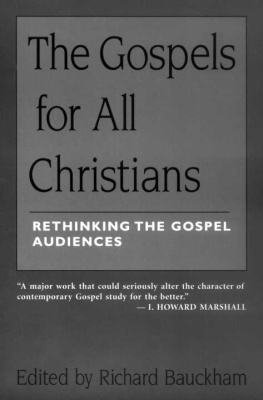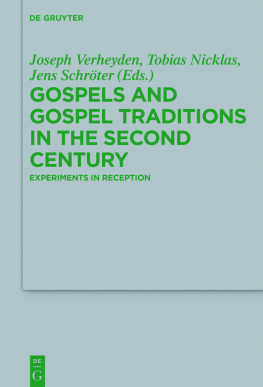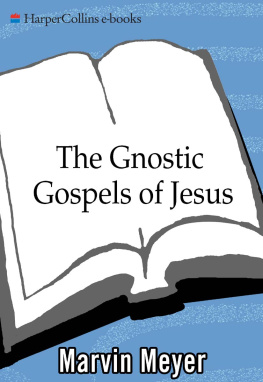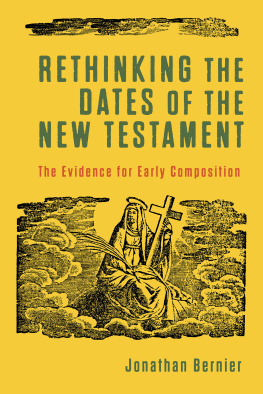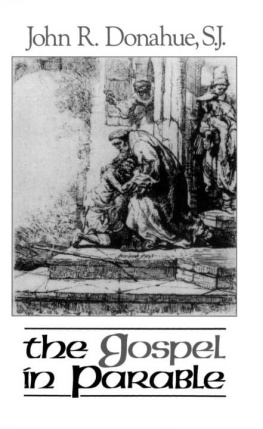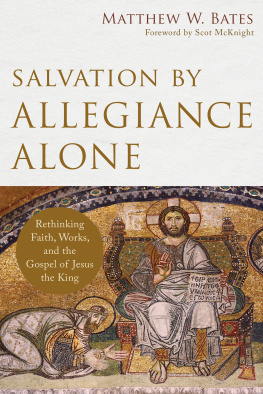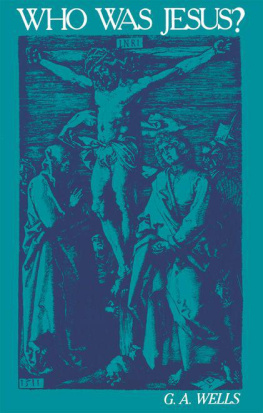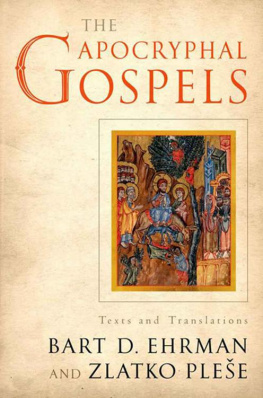The Gospels for All Christians: Rethinking the Gospel Audiences (New Testament Studies)
Here you can read online The Gospels for All Christians: Rethinking the Gospel Audiences (New Testament Studies) full text of the book (entire story) in english for free. Download pdf and epub, get meaning, cover and reviews about this ebook. year: 2009, genre: Religion. Description of the work, (preface) as well as reviews are available. Best literature library LitArk.com created for fans of good reading and offers a wide selection of genres:
Romance novel
Science fiction
Adventure
Detective
Science
History
Home and family
Prose
Art
Politics
Computer
Non-fiction
Religion
Business
Children
Humor
Choose a favorite category and find really read worthwhile books. Enjoy immersion in the world of imagination, feel the emotions of the characters or learn something new for yourself, make an fascinating discovery.
The Gospels for All Christians: Rethinking the Gospel Audiences (New Testament Studies): summary, description and annotation
We offer to read an annotation, description, summary or preface (depends on what the author of the book "The Gospels for All Christians: Rethinking the Gospel Audiences (New Testament Studies)" wrote himself). If you haven't found the necessary information about the book — write in the comments, we will try to find it.
Unknown: author's other books
Who wrote The Gospels for All Christians: Rethinking the Gospel Audiences (New Testament Studies)? Find out the surname, the name of the author of the book and a list of all author's works by series.
The Gospels for All Christians: Rethinking the Gospel Audiences (New Testament Studies) — read online for free the complete book (whole text) full work
Below is the text of the book, divided by pages. System saving the place of the last page read, allows you to conveniently read the book "The Gospels for All Christians: Rethinking the Gospel Audiences (New Testament Studies)" online for free, without having to search again every time where you left off. Put a bookmark, and you can go to the page where you finished reading at any time.
Font size:
Interval:
Bookmark:

Edited by
RICHARD BAUCKHAM
Richard Bauckham
Richard Bauckham
Michael B. Thompson
Loveday Alexander
Richard A. Burridge
Richard Bauckham
Stephen C. Barton
Francis Watson
The aim of this book is to challenge and to refute the current consensus in Gospels scholarship which assumes that each of the Gospels was written for a specific church or group of churches: the so-called Matthean community, Markan community, Lukan community, and Johannine community. It is a remarkable feature of the history of New Testament scholarship in this century that this consensus about the original intended audiences of the Gospels has come about without any substantial argument. Nearly all scholars writing about the Gospels now treat it as virtually self-evident that each evangelist addressed the specific context and concerns of his own community, and a large and increasingly sophisticated edifice of scholarly reconstruction has been erected on this basic assumption. It is widely used as the major hermeneutical key for reading the Gospels. But this view of the Gospels' intended audiences has never been justified by argument and discussion, and still less has it been established in debate with the other obvious possibility: that the Gospels were written with the intention that they should circulate around all the churches (and thence even outside the churches).
The present book challenges the consensus by arguing that it is probable that the Gospels were written for general circulation around the churches and so envisaged a very general Christian audience. Their implied readership is not specific but indefinite: any and every Christian community in the late-first-century Roman Empire. Many aspects of the Gospels and of early Christianity are relevant here. Of great importance is the extensive evidence that the early Christian movement was not, as the consensus in Gospels scholarship has increasingly assumed, a scattering of relatively isolated, introverted communities, but a network of communities in constant, close communication with each other. What we know of the "publication" and circulation of books in general in this period is relevant to the case of the Gospels. The question of Gospel genre, especially the strong recent trend to see the Gospels as belonging to the genre of ancient biography, has important implications that have not been appreciated by the consensus, which tends to read the Gospels as though they were Pauline letters. The reading strategies employed by the consensus to reconstruct the community each Gospel allegedly addresses from the Gospel texts need to be examined to see whether alternative reading strategies may not do better justice to the text. Finally, the hermeneutical implications for contemporary reading of the Gospels are considerable if the Gospels are recognized as (in Umberto Eco's terminology) "open" texts that leave their implied readership relatively open, rather than, as the consensus assumes, "closed" texts that define their implied readership very specifically. In the end, the hermeneutical issue is whether a Gospel should be read as a narrative about Jesus or as a narrative about a hypothetical Christian community that scholars can reconstruct behind the Gospel.
Thus the thesis of this book - that the Gospels were written for all Christians, not specific churches - has very wide ramifications both for the historical study and for the contemporary reading of the Gospels, and closely relates to the way the whole of the early Christian movement should be understood. By putting in question not only some key assumptions that are almost universally accepted in contemporary Gospels scholarship, but also a large body of conclusions that work based on those assumptions has reached, the book raises an issue of central importance for current New Testament scholarship. It aims to initiate a debate that will do justice to the importance of this issue. If its challenge to the consensus is successful, the direction of much current work on the Gospels will have to change and much work will need to be done again from a quite new perspective.
The book is a collaborative effort, resulting from a lecture given Other British scholars who found that the thesis he presented converged with the direction their own thought had been taking agreed to contribute to a book. An expanded version of Bauckham's lecture forms the first chapter of the book ("For Whom Were Gospels Written?"). This chapter sets out the thesis of the book, puts it in the context of the way the current consensus in Gospels scholarship has developed, presents the main arguments for the thesis, and introduces the main areas of evidence and discussion. It argues that, since all the evidence we have for the early Christian movement shows it to have been a network of communities in constant, close communication with each other, and since all the evidence we have for early Christian leaders (the kind of people who might have written Gospels) shows them to have been typically people who traveled widely and worked in more than one community at different times, the outlook and concerns of neither the early Christian communities nor their teachers would have been locally confined. Both had a strong, lively, and informed sense of participation in a worldwide movement. Even rivalry and conflict between early Christian leaders took place across the general network of Christian communication: it did not produce exclusive enclaves of churches out of communication with others. Moreover, the evidence we have shows that Christian literature did in fact circulate around the churches very rapidly, while some evidence shows the deliberate launching of literature produced in one major church into general circulation around other churches.
That someone should write one of the most sophisticated and carefully composed of early Christian literary works - a Gospel - simply for the members of the community in which he was then living, with its specific, local issues in view, thus becomes a quite implausible hypothesis. Knowing that his work was bound very quickly to reach many other churches, the audience he would address would be the Christians in any and every church to which his Gospel might circulate. His intended readership would be, not a specific community or even a defined group of communities, however large, but an open and indefinite category: any and every Christian community of his time in which Greek was understood. In envisaging an open category as their readership, the Gospels are like most literature of both that period and others. Since a Gospel does not address a specific community, we cannot expect to learn much from it about the evangelist's own community (even assuming he had only one, rather than a succession of very different ones), but in any case the enterprise of reconstructing such a community is hermeneutically irrelevant. The Matthean, Markan, Lukan, and Johannine communities should disappear from the terminology of Gospels scholarship.
Other chapters in the book presuppose the argument presented in the first chapter. They explore in more detail particular areas of discussion which that argument opens up and develop further implications of the argument.
Font size:
Interval:
Bookmark:
Similar books «The Gospels for All Christians: Rethinking the Gospel Audiences (New Testament Studies)»
Look at similar books to The Gospels for All Christians: Rethinking the Gospel Audiences (New Testament Studies). We have selected literature similar in name and meaning in the hope of providing readers with more options to find new, interesting, not yet read works.
Discussion, reviews of the book The Gospels for All Christians: Rethinking the Gospel Audiences (New Testament Studies) and just readers' own opinions. Leave your comments, write what you think about the work, its meaning or the main characters. Specify what exactly you liked and what you didn't like, and why you think so.

